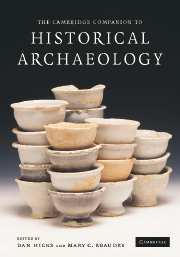Book contents
- Frontmatter
- Dedication
- Contents
- List of figures
- List of tables
- List of contributors
- Acknowledgements
- List of abbreviations
- 1 Introduction: the place of historical archaeology
- PART I ARCHAEOLOGY AND HISTORY
- PART II KEY THEMES IN HISTORICAL ARCHAEOLOGY
- 5 Historical archaeology and colonialism
- 6 Urban historical archaeology
- 7 Archaeology, heritage and the recent and contemporary past
- 8 Marxism and capitalism in historical archaeology
- 9 Historical archaeology and industrialisation
- 10 Historical maritime archaeology
- PART III HISTORICAL ARCHAEOLOGY AND MATERIAL CULTURE
- PART IV HISTORICAL ARCHAEOLOGY AND LANDSCAPES
- PART V HISTORICAL ARCHAEOLOGY AND BUILDINGS
- References
- Index
6 - Urban historical archaeology
from PART II - KEY THEMES IN HISTORICAL ARCHAEOLOGY
Published online by Cambridge University Press: 05 July 2015
- Frontmatter
- Dedication
- Contents
- List of figures
- List of tables
- List of contributors
- Acknowledgements
- List of abbreviations
- 1 Introduction: the place of historical archaeology
- PART I ARCHAEOLOGY AND HISTORY
- PART II KEY THEMES IN HISTORICAL ARCHAEOLOGY
- 5 Historical archaeology and colonialism
- 6 Urban historical archaeology
- 7 Archaeology, heritage and the recent and contemporary past
- 8 Marxism and capitalism in historical archaeology
- 9 Historical archaeology and industrialisation
- 10 Historical maritime archaeology
- PART III HISTORICAL ARCHAEOLOGY AND MATERIAL CULTURE
- PART IV HISTORICAL ARCHAEOLOGY AND LANDSCAPES
- PART V HISTORICAL ARCHAEOLOGY AND BUILDINGS
- References
- Index
Summary
Studies of the historical geographies of the towns and cities of the recent past through their material remains have developed within a broad multidisciplinary context. Ethnographers, cultural geographers, sociologists and others have examined the historical built environment within a spectrum of behavioural, spatial and historical sciences, while archaeologists have studied the development and abandonment of urban places across five millennia and around the world from a great range of perspectives. Many key themes in the contemporary social sciences, including capitalism, colonialism and the politics of identity, are implicated in the development of modern urban places. Over the past forty years historical archaeologists have aimed to contribute to the cross-disciplinary exchange, both by developing distinctive perspectives on towns and cities and by engaging with contemporary urban communities as they negotiate their urban heritages, whether standing buildings and landscapes or buried remains.
This chapter aims to explore the practical and intellectual contributions of the diverse traditions of urban historical archaeology. It places the historiography of urban historical archaeology within its wider cross-disciplinary context and provides a detailed case study, drawn from New York and Philadelphia, that explores how historical archaeologists have researched streetscapes, buildings and backyards. The chapter concludes with reflections on how archaeological practice and archaeological knowledge shape contemporary living within urban environments.
CHANGES IN ARCHAEOLOGICAL CONCEPTIONS OF HISTORICAL TOWNS
The archaeological analysis of urban space is complex. There are two principal practical challenges. First, cities are vast archaeological sites. Urban landscapes extend across hundreds, and often thousands, of square miles. ‘Historic cores’, as conventionally defined, tend to be relatively small, but they are still among the most complex of all archaeological sites in their histories of development, and significantly larger in area and stratigraphic depth. Moreover, the extensive settled areas that stretch out beyond such ‘historic cores’ are also of interest, and these have complex histories in their own right.
- Type
- Chapter
- Information
- The Cambridge Companion to Historical Archaeology , pp. 87 - 103Publisher: Cambridge University PressPrint publication year: 2006
- 12
- Cited by



